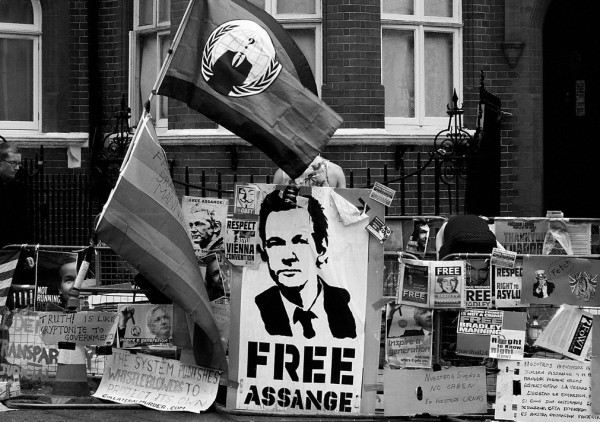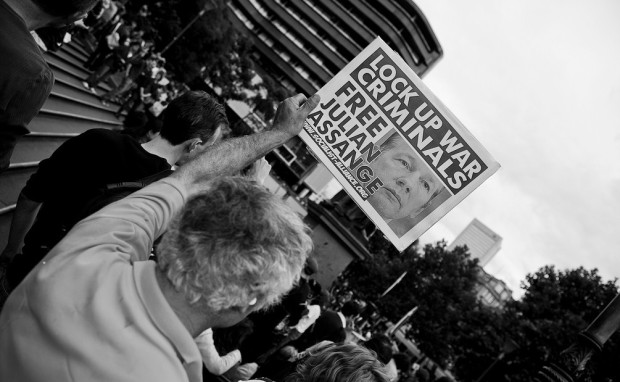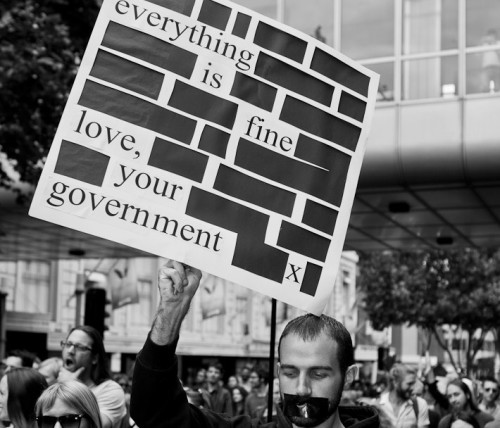Celebrating Independence from America in England

There Are Only 22 Countries in the World That the British Haven’t Invaded. Now the Brits have become an ignoble appendage of the American empire. Some are beginning to chafe under the weight of foreign hegemony.
By David Swanson
Remarks at Independence from America event outside Menwith Hill “RFA” (NSA) base in Yorkshire.
http://warisacrime.org/content/celebrating-independence-america-england
[F]irst of all, thank you to Lindis Percy and everyone else involved in bringing me here, and letting me bring my son Wesley along.
And thank you to the Campaign for the Accountability of American Bases. I know you share my view that accountability of American bases would lead to elimination of American bases.
And thank you to Lindis for sending me her accounts of refusing to be arrested unless the police disarmed themselves. In the United States, refusing any sort of direction from a police officer will get you charged with the crime of refusing a lawful order, even when the order is unlawful. In fact, that’s often the only charge levied against people ordered to cease protests and demonstrations that in theory are completely legal. And, of course, telling a U.S. police officer to disarm could quite easily get you locked up for insanity if it didn’t get you shot.
Can I just say how wonderful it is to be outside of the United States on the Fourth of July? There are many wonderful and beautiful things in the United States, including my family and friends, including thousands of truly dedicated peace activists, including people bravely going to prison to protest the murders by drone of others they’ve never met in distant lands whose loved ones will probably never hear about the sacrifices protesters are making. (Did you know the commander of a military base in New York State has court orders of protection to keep specific nonviolent peace activists away from his base to ensure his physical safety — or is it his peace of mind?) And, of course, millions of Americans who tolerate or celebrate wars or climate destruction are wonderful and even heroic in their families and neighborhoods and towns — and that’s valuable too.
I’ve been cheering during U.S. World Cup games. But I cheer for neighborhood, city, and regional teams too. And I don’t talk about the teams as if I’m them. I don’t say “We scored!” as I sit in a chair opening a beer. And I don’t say “We won!” when the U.S. military destroys a nation, kills huge numbers of people, poisons the earth, water, and air, creates new enemies, wastes trillions of dollars, and passes its old weapons to the local police who restrict our rights in the name of wars fought in the name of freedom. I don’t say “We lost!” either. We who resist have a responsibility to resist harder, but not to identify with the killers, and certainly not to imagine that the men, women, children, and infants being murdered by the hundreds of thousands constitute an opposing team wearing a different uniform, a team whose defeat by hellfire missile I should cheer for.
Identifying with my street or my town or my continent doesn’t lead the same places that identifying with the military-plus-some-minor-side-services that calls itself my national government leads. And it’s very hard to identify with my street; I have such little control over what my neighbors do. And I can’t manage to identify with my state because I’ve never even seen most of it. So, once I start identifying abstractly with people I don’t know, I see no sensible argument for stopping anywhere short of identifying with everybody, rather than leaving out 95% and identifying with the United States, or leaving out 90% and identifying with the so-called “International Community” that cooperates with U.S. wars. Why not just identify with all humans everywhere? On those rare occasions when we learn the personal stories of distant or disparaged people, we’re supposed to remark, “Wow, that really humanizes them!” Well, I’d like to know, what were they before those details made them humanized?
In the U.S. there are U.S. flags everywhere all the time now, and there’s a military holiday for every day of the year. But the Fourth of July is the highest holiday of holy nationalism. More than any other day, you’re likely to see children being taught to pledge allegiance to a flag, regurgitating a psalm to obedience like little fascist robots. You’re more likely to hear the U.S. national anthem, the Star Spangled Banner. Who knows which war the words of that song come from?
That’s right, the War of Canadian Liberation, in which the United States tried to liberate Canadians (not for the first or last time) who welcomed them much as the Iraqis would later do, and the British burned Washington. Also known as the War of 1812, the bicentennial was celebrated in the U.S. two years ago. During that war, which killed thousands of Americans and Brits, mostly through disease, during one pointless bloody battle among others, plenty of people died, but a flag survived. And so we celebrate the survival of that flag by singing about the land of the free that imprisons more people than anywhere else on earth and the home of the brave that strip-searches airplane passengers and launches wars if three Muslims shout “boo!”
Did you know the U.S. flag was recalled? You know how a car will be recalled by the manufacturer if the brakes don’t work? A satirical paper called the Onion reported that the U.S. flag had been recalled after resulting in 143 million deaths. Better late than never.
There are many wonderful and rapidly improving elements in U.S. culture. It has become widely and increasingly unacceptable to be bigoted or prejudiced against people, at least nearby people, because of their race, sex, sexual orientation, and other factors. It still goes on, of course, but it’s frowned upon. I had a conversation last year with a man sitting in the shadow of a carving of confederate generals on a spot that used to be sacred to the Ku Klux Klan, and I realized that he would never, even if he thought it, say something racist about blacks in the United States to a stranger he’d just met. And then he told me he’d like to see the entire Middle East wiped out with nuclear bombs.
We’ve had comedians’ and columnists’ careers ended over racist or sexist remarks, but weapons CEOs joke on the radio about wanting big new occupations of certain countries, and nobody blinks. We have antiwar groups that push for celebration of the military on Memorial Day and other days like this one. We have so-called progressive politicians who describe the military as a jobs program, even though it actually produces fewer jobs per dollar than education or energy or infrastructure or never taxing those dollars at all. We have peace groups that argue against wars on the grounds that the military needs to be kept ready for other, possibly more important wars. We have peace groups that oppose military waste, when the alternative of military efficiency is not what’s needed. We have libertarians who oppose wars because they cost money, exactly as they oppose schools or parks. We have humanitarian warriors who argue for wars because of their compassion for the people they want bombed. We have peace groups that side with the libertarians and urge selfishness, arguing for schools at home instead of bombs for Syrians, without explaining that we could give actual aid to Syrians and ourselves for a fraction of the cost of the bombs.
We have liberal lawyers who say they can’t tell whether blowing children up with drones is legal or not, because President Obama has a secret memo (now only partially secret) in which he legalizes it by making it part of a war, and they haven’t seen the memo, and as a matter of principle they, like Amnesty International and Human Rights Watch, ignore the U.N. Charter, the Kellogg Briand Pact, and the illegality of war. We have people arguing that bombing Iraq is now a good thing because it finally gets the U.S. and Iran talking to each other. We have steadfast refusals to mention a half-million to a million-and-a-half Iraqis based on the belief that Americans can only possibly care about 4,000 Americans killed in Iraq. We have earnest crusades to turn the U.S. military into a force for good, and the inevitable demand of those who begin to turn against war, that the United States must lead the way to peace — when of course the world would be thrilled if it just brought up the rear.
And yet, we also have tremendous progress. A hundred years ago Americans were listening to snappy tunes about how hunting Huns was a fun game to play, and professors were teaching that war builds national character. Now war has to be sold as necessary and humanitarian because nobody believes it’s fun or good for you anymore. Polls in the United States put support for possible new wars below 20 percent and sometimes below 10 percent. After the House of Commons over here said No to missile strikes on Syria, Congress listened to an enormous public uproar in the U.S. and said No as well. In February, public pressure led to Congress backing off a new sanctions bill on Iran that became widely understood as a step toward war rather than away from it. A new war on Iraq is having to be sold and developed slowly in the face of huge public resistance that has even resulted in some prominent advocates of war in 2003 recently recanting.
This shift in attitude toward wars is largely the result of the wars on Afghanistan and Iraq and the exposure of the lies and horrors involved. We shouldn’t underestimate this trend or imagine that it’s unique to the question of Syria or Ukraine. People are turning against war. For some it may be all about the money. For others it may be a question of which political party owns the White House. The Washington Post has a poll showing that almost nobody in the U.S. can find Ukraine on a map, and those who place it furthest from where it really lies are most likely to want a U.S. war there, including those who place it in the United States. One doesn’t know whether to laugh or cry. Yet the larger trend is this: from geniuses right down to morons, we are, most of us, turning against war. The Americans who want Ukraine attacked are fewer than those believing in ghosts, U.F.O.s, or the benefits of climate change.
Now, the question is whether we can shake off the idea that after hundreds of bad wars there just might be a good one around the corner. To do that we have to recognize that wars and militaries make us less safe, not safer. We have to understand that Iraqis aren’t ungrateful because they’re stupid but because the U.S. and allies destroyed their home.
We can pile even more weight on the argument for ending the institution of war. These U.S. spy bases are used for targeting missiles but also for spying on governments and companies and activists. And what justifies the secrecy? What allows treating everyone as an enemy? Well, one necessary component is the concept of an enemy. Without wars nations lose enemies. Without enemies, nations lose excuses to abuse people. Britain was the first enemy manufactured by the would-be rulers of the United States on July 4, 1776. And yet King George’s abuses don’t measure up to the abuses our governments now engage in, justified by their traditions of war making and enabled by the sort of technologies housed here.
War is our worst destroyer of the natural environment, the worst generator of human rights abuses, a leading cause of death and creator of refugee crises. It swallows some $2 trillion a year globally, while tens of billions could alleviate incredible suffering, and hundreds of billions could pay for a massive shift to renewable energies that might help protect us from an actual danger.
What we need now is a movement of education and lobbying and nonviolent resistance that doesn’t try to civilize war but to take steps in the direction of abolishing it — which begins by realizing that we can abolish it. If we can stop missiles into Syria, there’s no magical force that prevents our stopping missiles into every other country. War is not a primal urge of nations that must burst out a little later if once suppressed. Nations aren’t real like that. War is a decision made by people, and one that we can make utterly unacceptable.
People in dozens of countries are now working on a campaign for the elimination of all war called World Beyond War. Please check out WorldBeyondWar.org or talk to me about getting involved. Our goal is to bring many more people and organizations into a movement not aimed at a specific war proposal from a specific government, but at the entire institution of war everywhere. We’ll have to work globally to do this. We’ll have to throw our support behind the work being done by groups like the Campaign for Accountability of American Bases and the Movement for the Abolition of War and the Campaign for Nuclear Disarmament and Veterans For Peace and so many more.
Some friends of ours in Afghanistan, the Afghan Peace Volunteers, have proposed that everyone living under the same blue sky who wants to move the world beyond war wear a sky blue scarf. You can make your own or find them at TheBlueScarf.org. I hope by wearing this to communicate my sense of connection to those back in the United States working for actual freedom and bravery, and my same sense of connection to those in the rest of the world who have had enough of war. Happy Fourth of July!
David Swanson wants you to declare peace at http://WorldBeyondWar.org His new book is War No More: The Case for Abolition. He blogs at http://davidswanson.org and http://warisacrime.org and works for http://rootsaction.org. He hosts Talk Nation Radio. Follow him on Twitter: @davidcnswanson and FaceBook.
Sign up for occasional important activist alerts here http://davidswanson.org/signup
Sign up for articles or press releases here http://davidswanson.org/lists








